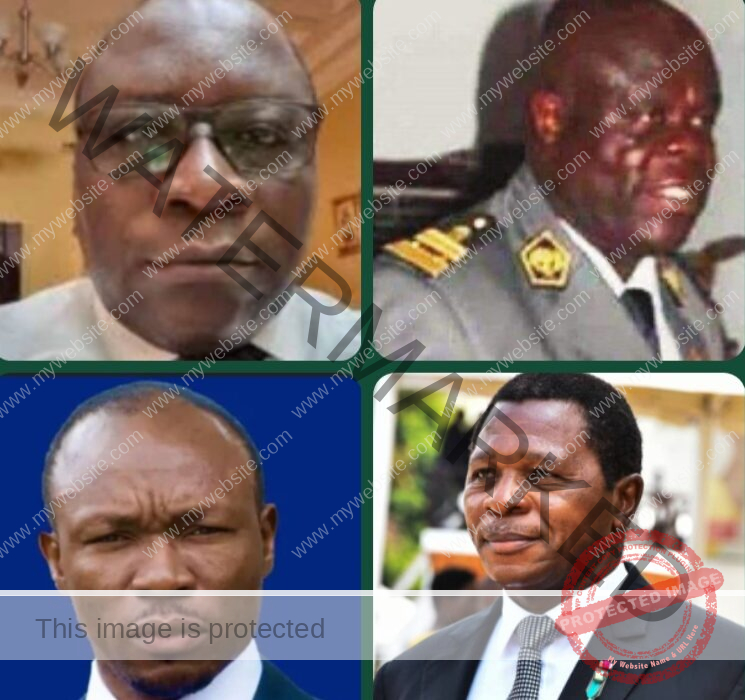Regime operatives made this possible: Eli Smith as liaison, Colonel Bamkoui for operational clearance, the chief of the secret police for monitoring, and Paul Atanga Nji, Minister of Territorial Administration, for political cover.
By The Independentist Investigative Desk
Introduction: The Corporate Tyranny
Paul Biya’s regime has never functioned as a democracy. For over four decades, it has operated as a corporation — with shareholders in Paris, lobbyists in Washington, and a boardroom of cronies in Yaoundé. Its logic logic is corporate, not constitutional: proxies are cultivated, exploited, and discarded; alliances are transactional; betrayal is policy.
This is the art of the double cross — the Biya corporation’s survival strategy. The story of the Ambazonia Defence Forces (ADF), the Kansas City 3, and the Washington bargains exposes the anatomy of this betrayal.
A History of Double Crosses
The ADF saga follows a long line of betrayals:
1961 Plebiscite: Southern Cameroons voted for a federation, not annexation. Within months, equality was scrapped.
1972 Referendum: Ahmadou Ahidjo staged a sham vote to dissolve federalism.
1984: Paul Biya erased Southern Cameroons’ legal identity by reverting to La République du Cameroun.
Every supposed compromise with Yaoundé ended in betrayal.
ADF: From Proxy Asset to Liability
Cecce Buckley’s investigation revealed what many Ambazonians suspected: the ADF under Cho Ayaba was tolerated and equipped by Yaoundé.
Regime operatives made this possible: Eli Smith as liaison, Colonel Bamkoui for operational clearance, the chief of the secret police for monitoring, and Paul Atanga Nji, Minister of Territorial Administration, for political cover.
The proof was visible. On Ambazonia’s national day, ADF paraded in pickup trucks painted with their insignia — while other groups, like ARF, dared not appear. The people asked: who supplied these trucks? The answer was simple: the regime itself.
ADF became the glove hiding the regime’s iron fist, carrying out attacks that allowed Yaoundé to claim that “violence comes from both sides.”
The Arrest of Cho Ayaba: Norwegian Intelligence, Not Nsahlai
When Cho Ayaba was arrested, regime propaganda attempted to credit Chris Nsahlai. In reality, it was Norwegian intelligence that acted. Nsahlai never prosecuted anyone in Norway.
What Nsahlai did do was exploit geography. As Buckley reported, several ADF commanders who had openly admitted to civilian killings were based in the United States. Nsahlai seized on that fact, pushing indictments.
Yet glaring inconsistencies remain. If justice was the motive, why were Capo Daniel (alias Ngong Emmanuel Ngong) and Asu Lucas, both based in Canada, untouched? Why were some commanders pursued and others ignored? The answer is political convenience, not accountability.
Biden’s Shift: Washington Deals
The Trump administration kept Biya under pressure, reducing aid and limiting military cooperation.
The Biden administration, however, reversed course. Biya’s lobbyists infiltrated Washington, and against all expectations, Paul Biya was invited to the U.S. capital. For Ambazonians, it was a humiliation and a betrayal — a slap in the face.
Behind closed doors, deals were struck. The Kansas City 3 became bargaining chips. By sacrificing proxies like the ADF and offering up indictments, Biya secured renewed legitimacy and reprieve from international scrutiny.
The Corporate Double Cross
Once useful, ADF was tolerated. Once inconvenient, it was betrayed. The indictments against ADF leaders and the Kansas City 3 were part of this double cross.
At the same time, the regime sought to broaden the dragnet, hoping to ensnare its greatest enemy — President Dr. Samuel Ikome Sako.
This is how corporations work: assets are exploited, then discarded. And if the gamble fails? In America, innocence is presumed until guilt is proven. But in Yaoundé, guilt is assumed, and punishment is automatic. Hence the regime’s desperate lobbying for extradition.
Cameroon Inc.: Assets, Liabilities, Shareholders
Cameroon under Biya is best understood as a corporation:
Assets: Proxies like ADF — useful until they threaten the boardroom.
Liabilities: The Kansas City 3 and others indicted abroad.
Board of Directors: CPDM elites, generals, and operatives like Atanga Nji and Bamkoui.
Shareholders: France, lobbyists in Washington, and corporate partners exploiting Cameroon’s oil, timber, and minerals.
Ambazonians are not citizens in this model. They are expendable labor and cannon fodder.
The French Fifth Republic Model Cracks
The deeper truth is this: Biya’s double cross politics are not uniquely Cameroonian. They are French.
Since Charles de Gaulle founded the Fifth Republic in 1958, Paris exported its “presidential monarchy” model to Africa — a façade of democracy built on sandy foundations. It was designed for control, not compromise; for dominance, not dialogue.
For decades, France’s protégés thrived under this model. But today, both Macron in Paris and Biya in Yaoundé are struggling. Their monarchies are under extreme stress tests. Protests, resistance, and international exposure reveal that the system itself is collapsing. The Fifth Republic, imposed on Africa, is unraveling in its own backyard.
Biya’s fall, like Macron’s fragility, proves the same point: a democracy built on deceit and centralized presidential power cannot withstand the weight of history.
The World Is Watching
The Biya corporation is desperate. Its operatives — Eli Smith, Bamkoui, Atanga Nji, the secret police — are exposed. Its proxies — Cho Ayaba, Capo Daniel, Asu Lucas — are divided between indulgence and betrayal. Its Washington deals are no longer hidden.
The international community is beginning to connect the dots: Yaoundé has not fought terrorism, it has manufactured it. It has created proxies, armed them, deployed them, and then betrayed them when politically expedient.
Conclusion: Betrayal as Policy
From the 1961 plebiscite to the 1972 referendum, from the 1984 name-change to the Kansas City 3 indictments, the story has remained unchanged: every compromise with Yaoundé ends in betrayal.
The ADF’s fate is not unique. It is the destiny of all proxies in Biya’s corporate empire. Today it is ADF. Tomorrow it will be another.
This is the art of the double cross. And Ambazonia must understand: survival will not come from compromise, but from clarity.
The Independentist Investigative Desk

